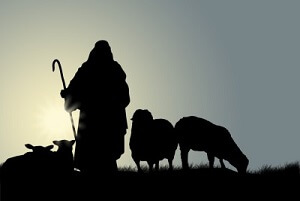
My father was an English teacher and a farmer. His discipline was gentle. When he saw me doing something he thought needed correcting, he often would find a poem that contained the truth he wanted to teach me. We would lie on our stomachs across my parents’ bed and read the poem together. We would talk about what the poem meant and what my father had noticed in me. He never required that I memorize the poem, but I often did.
One of those poems was called “Life’s Mirror” by Madeline Bridges. It had the lines,
“Then give to the world the best that you have,
And the best will come back to you.”
I don’t remember what act of selfishness or carelessnesss on my part led to my father and I reading that poem together, but today’s readings caused the lines of the poem to pop into my head.
Abram had done what God had asked of him, to go to Canaan, and so he and his nephew, Lot, had prospered. They prospered so much their herdsmen began to argue about grazing land and water. There were so many livestock the land could not readily support them all.
Abram said to Lot, “Let there be no strife between you and me, or between your herdsmen and mine, for we are kinsmen. Is not the whole land at your disposal? Please separate from me. If you prefer the left, I will go to the right; if you prefer the right, I will go to the left.”
Abram gave the best he had to Lot. Generosity. He let Lot take first pick. Lot saw the fertile Jordan plain to the East and chose that. Abram went West, toward the sea. God was pleased at Abram’s generosity! “Look about you…all the land you can see I will give your descendants forever.”
Jesus put that principle into some of the final admonitions of the Sermon on the Mount in today’s gospel. We hear the familiar Golden Rule: “Do unto others whatever you would have them do to you.”
Abram practiced the Golden Rule with Lot. He treated him as he would have Lot treat him.
But what about the first part of the gospel today? “Do not give what is holy to dogs, or throw your pearls before swine, lest they trample them underfoot, and turn and tear you to pieces.” THAT doesn’t sound like “give to the world the best you have.” That doesn’t sound like the Golden Rule.
Why did Jesus say that?
I have puzzled, and I’m not sure I know the answer. But perhaps an answer lies quietly in parts of the story of Abram today and yesterday. As we read about Abram’s conversations and journeys with God, we read again and again the lines: “He built an altar to the Lord.”
Abram recognized the generosity God had shown him.
He encountered God. Each time he and God had conversation, God gave or promised gift to Abram. God expressed His generosity FIRST. Abram responded. He built an altar. He recognized the gift—and the Giver. He recognized that God was giving first.
Then Abram gave the best he had to God: he built an altar and worshiped. Within the context of THAT PRIMARY RELATIONSHIP, he THEN gave the best he had to Lot. He passed on God’s generosity.
Generosity for a Christian can be a narrow gate. We are called to respond to God’s generosity with praise and worship. We are called to respond to practical problems in the world by generously giving our best to others—treating them always with the respect with which we would like to be treated.
My father did not see that whole picture when he taught me poetry. You see, when my father and I used to read poetry, he was not yet a Christian. For him, it was a humanist ideal and good practical tactic: Give the best you have. When you give your best, you are more likely to have goodness returned to you. You give because you expect to get.
Abram gave because he had already received from God. He passed on God’s generosity. He gave because he had already gotten.
Lot responded in a self-centered way, “Lot looked about and saw how well watered the whole Jordan Plain was…Lot, therefore, chose for himself the whole Jordan Plain and set out eastward.”
But I don’t think Abram was disturbed. He had not given what was holy to the dogs. He had not cast pearls before swine. He had entered through the narrow gate of simply passing on what he had been given. The consequences of that choice he left up to God’s continued generosity. That was faith!
Generosity is a fruit of the Holy Spirit. It is a sign that God is in us.
My father taught me to be generous and give my best. But Jesus teaches me now to look at how come I do that: To get back good things? From habit? To maintain my own integrity? To save the world by my efforts?
Abram and Jesus gently call me today to something better, deeper, richer: to be generous because I have received God’s generosity; to be generous because I continue to trust in God.
